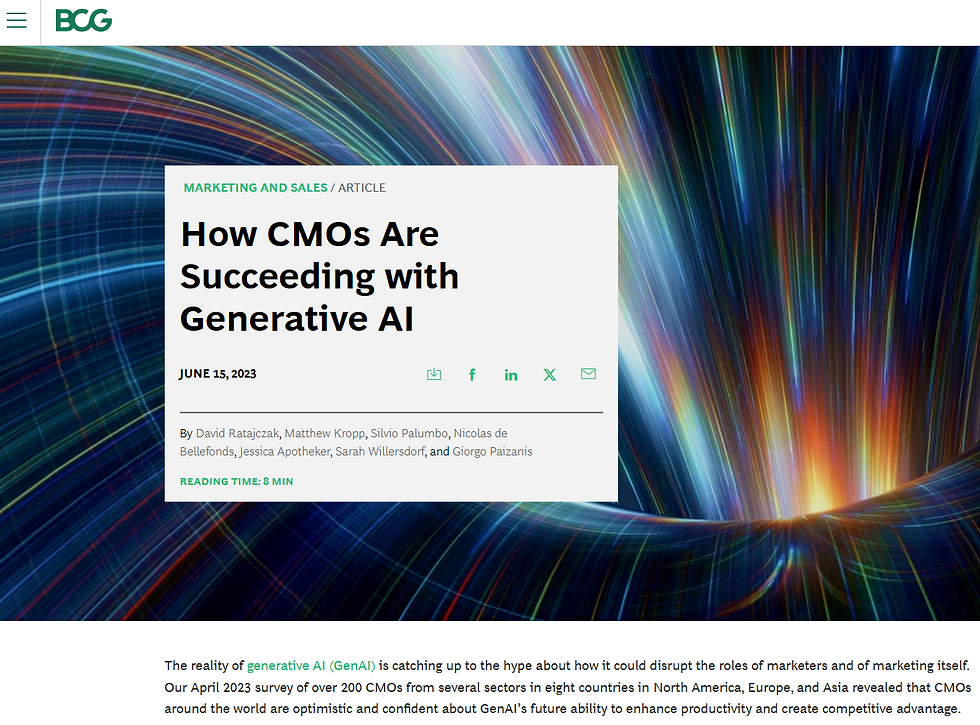Unveiling the Future: The Role of Generative AI in Transforming Marketing
- Marie Horodecki Aymes
- Aug 22, 2024
- 4 min read
Updated: Aug 27, 2024

I recently read a groundbreaking research from Capgemini, which offers a compelling glimpse into the transformative role of generative AI in the marketing industry. Titled "The Future of Marketing: Leveraging Generative AI," this study not only highlights the emergence of generative AI as a pivotal tool in the realm of marketing, but also delves into its potential to redefine creativity, strategy, and customer engagement.
As we unpack the insights from this research, it becomes evident that generative AI is not just an emerging technology; it's a paradigm shift, reshaping the very core of marketing practices and strategies. This article aims to explore the profound impact and possibilities of generative AI, setting the stage for a future where AI-driven marketing is not just a possibility, but a fundamental component of business success.
Revolutionizing Creativity: The Power of Generative AI
Learning and Reapplying Data Generative AI systems don't just learn; they innovate. By analyzing vast amounts of data, they identify patterns and structures, laying the foundation for unprecedented creative tasks.
Bridging Human and Machine Creativity Once a solely human domain, creativity is now shared with machines. From art creation to writing and decision-making, generative AI is redefining the boundaries of innovation.
Customization at Its Core The technology excels in creating tailored content, adapting to individual preferences or specific audience segments, ensuring that each piece of content is as unique as the person interacting with it.
Continual Evolution These AI systems are in a state of constant learning, evolving to provide better, more accurate outputs as they process more data and receive feedback.
Marketing Transformation with AI In marketing, this translates into an era of content creation and customer engagement, where personalization and strategic decision-making are based on deep, insightful data analysis.
Strategic Implementation: A Step-by-Step Guide
Assessment: Evaluate your current marketing strategy for AI integration opportunities.
Goal Setting: Define objectives aligned with your business goals.
Technology Selection: Choose AI technologies that meet these objectives.
Pilot Testing: Test these solutions in small-scale, real-world projects.
Data Management: Establish robust data practices for accurate AI feeding.
Scaling: Expand AI implementation based on pilot project insights.
Continuous Optimization: Regularly monitor and adjust AI performance.
Ethical and Legal Considerations: Navigating the AI Landscape
Do's:
Ensure Transparency: Be clear about AI use, especially in customer interactions.
Respect Privacy: Adhere to data protection regulations like GDPR.
Use Ethical Data: Train AI models with unbiased, ethically sourced data.
Maintain Human Oversight: Mitigate unintended consequences with human supervision.
Follow Copyright Laws: Stay vigilant about intellectual property rights.
Don'ts:
Avoid Misleading with AI: Use AI responsibly, avoiding deception.
Never Compromise on Data Security: Prioritize the protection of customer information.
Address AI Bias: Actively work to eliminate biases in AI algorithms and data.
Respect User Consent: Use customer data only with explicit permission.
Balance AI with Human Judgment: Use AI as a tool, not a replacement for human creativity.
Real-World Success Stories: AI in Action
Continental
This automotive giant partnered with Google Cloud, enhancing driver experiences with natural dialogue systems for real-time information on tire pressure, local attractions, and more.
Nike
Through their "Nike By You" platform, Nike lets customers design custom sneakers. The AI suggests unique designs based on user preferences, revolutionizing product personalization.
Walmart
Walmart is experimenting with AI to enhance the shopping experience, from AI-powered search functions to virtual interior design tools.
Practical Steps for CMOs: Harnessing AI's Potential
Understand AI's Capabilities: Know what AI can and cannot do.
Align AI with Business Goals: Ensure AI initiatives support broader objectives.
Start Small, Scale Up: Begin with manageable projects and expand based on learning.
Build AI Skills: Develop AI expertise within your marketing team.
Monitor and Adjust: Continuously evaluate and refine AI-driven strategies.
Stay Informed and Adaptable: Keep up with AI developments and integrate new solutions.
My opinion
The advent of generative AI in marketing is not just a fleeting trend; it's a seismic shift that redefines the very fabric of marketing strategies and customer engagement. As we stand at the cusp of this AI revolution, one thing is abundantly clear: businesses that fail to embrace generative AI risk obsolescence in a rapidly evolving digital landscape.
Generative AI is not merely a tool; it's a collaborator that brings a level of creativity and efficiency previously unimaginable. The ability to generate personalized content, understand complex consumer behaviors, and create marketing campaigns with precision and flair, once the domain of human expertise, is now exponentially enhanced by AI's prowess.
The ethical and legal implications of AI in marketing are profound. Navigating this new terrain requires a delicate balance between leveraging AI's capabilities and maintaining a commitment to ethical practices and legal compliance. The businesses that will thrive are those that recognize and respect these boundaries while innovatively pushing the limits of what's possible in marketing.
In essence, generative AI is not just transforming marketing; it's challenging us to reimagine the possibilities of human-machine collaboration. It's a journey of continuous learning, adaptation, and innovation. Those willing to embark on this journey will find themselves at the forefront of a marketing revolution, shaping the future of how businesses connect with and captivate their audiences. The question for marketers and businesses now is not if they will adapt to generative AI, but how swiftly and effectively they will do so to remain competitive and relevant in this new era.
For more detailed insights
The Future of Marketing: Leveraging Generative AI,
How generative AI can boost consumer marketing
How CMOs Are Succeeding with generative AI





Comments